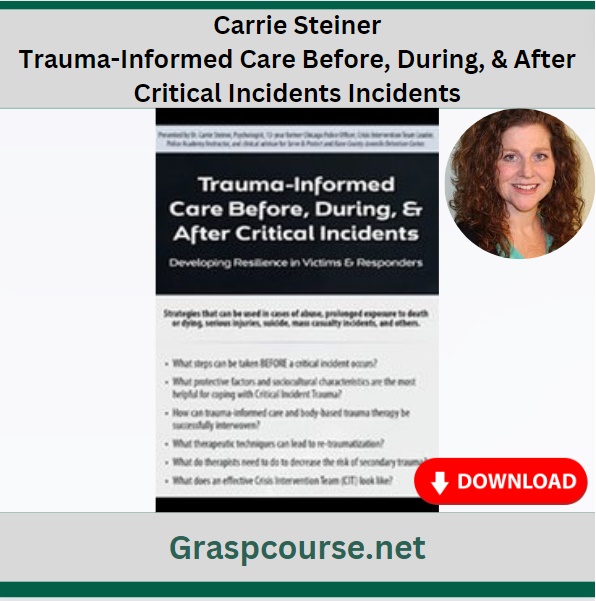Carrie Steiner – Trauma-Informed Care Before, During, & After Critical Incidents
$219.00 Original price was: $219.00.$61.75Current price is: $61.75.
Carrie Steiner Trauma-Informed Care Before, During, & After Critical Incidents Course [Instant Download]

1️⃣. What is Trauma-Informed Care Before, During, & After Critical Incidents:
Dr. Carrie Steiner’s course teaches trauma-informed care for critical incidents. It’s designed for first responders, healthcare professionals, and public safety personnel.
The course covers E.M.D.R., cognitive behavioral therapy, and exposure therapy. It aims to improve resilience and recovery rates during critical situations.
? PROOF OF COURSE

2️⃣. What you will learn in Trauma-Informed Care Before, During, & After Critical Incidents:
- Understanding the brain’s response to trauma and the psychological mechanisms at play.
- Implementing E.M.D.R, exposure, and cognitive behavioral therapy in various trauma-related situations.
- Recognizing and addressing the bidirectional relationships of trauma with substance abuse and mental illness.
- Insights into the DSM-5® criteria for PTSD, ASD, and other trauma-related disorders.
- Mastering pre-event, event, and post-event strategies to enhance trauma coping abilities and promote healing.
- Practical approaches for reducing secondary trauma among professionals working in high-stress environments.
3️⃣. Who is Carrie Steiner?

Dr. Carrie Steiner, a seasoned clinical psychologist and former Chicago Police Officer, brings a unique blend of field experience and academic expertise to the realm of trauma-informed care. With over 13 years of service in law enforcement, including roles as a Crisis Intervention Team Leader and Chicago Police Academy Instructor, Dr. Steiner has firsthand experience in managing high-stress situations. She holds a doctorate from the Illinois School of Professional Psychology and is a certified trauma professional specialized in E.M.D.R., cognitive behavioral therapy, and exposure therapy.
Dr. Steiner’s career is marked by her commitment to enhancing the psychological resilience of first responders and public safety personnel. Her work extends beyond therapy and evaluations to providing vital training and support for dealing with trauma before, during, and after critical incidents. Dr. Steiner’s contributions have been recognized with several national and local awards, affirming her as a leading figure in trauma-informed care.
4️⃣. Who should take this course?
- Ideal for First Responders: Whether you are a police officer, firefighter, or paramedic, this course equips you with crucial skills to manage personal and community trauma.
- Healthcare Professionals: Psychologists, therapists, and counselors will find advanced techniques to enhance their practice and support trauma-affected individuals.
- Public Safety Personnel: Anyone involved in crisis management and public safety can benefit from the comprehensive strategies taught in this course.
- Educators and Social Workers: Gain insights into trauma-informed care that can transform how you work with vulnerable populations. Community Leaders and Policy Makers: Understanding trauma-informed care can guide decision-making processes and improve community health outcomes.
This course is designed to empower professionals across various sectors with the tools necessary to improve both their own resilience and that of those they serve.
5️⃣. Frequently Asked Questions:
Q1: What is psychological resilience and why is it so important?
Psychological resilience refers to the ability to mentally or emotionally cope with a crisis or return to pre-crisis status quickly. Resilience exists when people use mental processes and behaviors in promoting personal assets and protecting themselves from the potential negative effects of stressors. It is crucial because it determines how individuals navigate through stress and hardships, improving their overall mental health and stability.
Q2: What are the 5 principles of trauma-informed care?
The five principles of trauma-informed care include Safety, Choice, Collaboration, Trustworthiness, and Empowerment. These principles ensure that environments and interactions foster a sense of security, respect survivors’ rights to make choices, encourage participation in decision-making, build trust, and enhance empowerment.
Q3: What is the most effective intervention for trauma?
While the effectiveness of trauma interventions can vary depending on the individual and the context, trauma-focused cognitive behavioral therapy (TF-CBT) is widely recognized as one of the most effective. This approach involves identifying and altering unhealthy patterns of thought and behavior, helping individuals process and make sense of their trauma.
Q4: What are the 4 phases of crisis mental health?
The four phases of crisis mental health are Mitigation, Preparedness, Response, and Recovery. Mitigation involves reducing the risk of crisis impacts. Preparedness focuses on planning to handle an emergency. Response deals with the immediate actions taken to manage the crisis. Recovery focuses on returning to normalcy and rehabilitating from the crisis.
Q5: How to build resilience after trauma?
Building resilience after trauma involves several key steps: acknowledging and accepting feelings during the healing process; seeking support from friends, family, or professionals; engaging in regular physical activity; maintaining routines; and practicing mindfulness and positive thinking. It’s also important to avoid harmful coping strategies and give yourself time to adjust and heal.
Q & A
Related products
Health & Medical
Health & Medical
Health & Medical
Health & Medical
Health & Medical












Reviews
There are no reviews yet